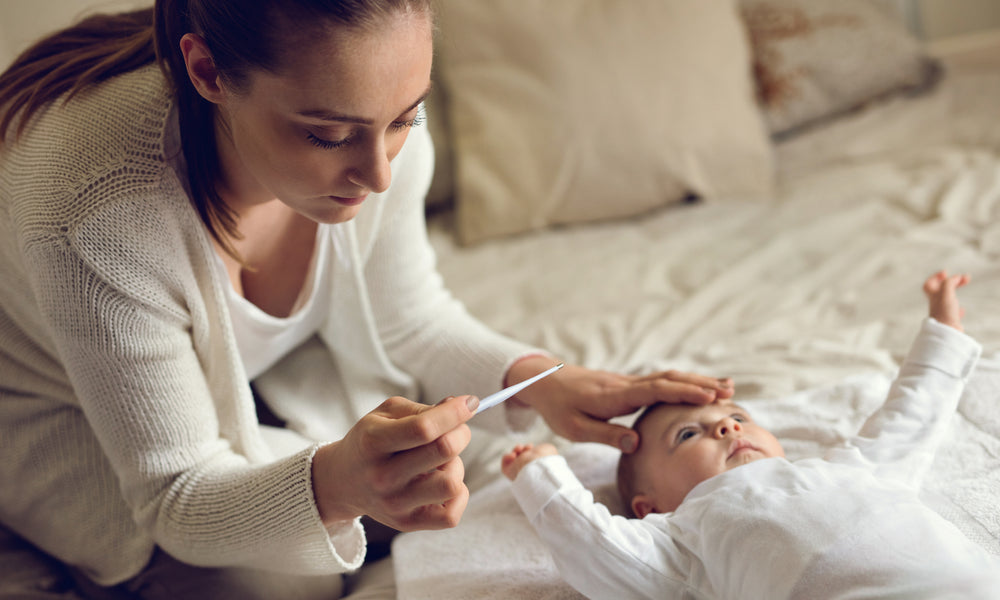What to Do When Baby Wakes up Sick

by Linda Scruggs
Dec 13, 2018
Is it just me or does it seem as if babies and kids get sick more often after 9 p.m.? My kids always seemed to become sick or feel worse at night and I had many sleepless hours in those early years.
It’s certainly no fun to wake up to the sudden cries of a baby or child that is feeling ill. It can be jarring when it’s the middle of the night and we aren’t going to even get into the next morning when everyone is exhausted.
When a baby wakes up sick at night, anyone can naturally become overwhelmed, but it can help to feel prepared. Here are a few tips to consider if you wake up to a sick baby:
Article Continues Below Advertisement
What to Do When Baby Wakes up Sick
1. FEVER
If your baby spikes a fever at night (or any time!), you want to be sure to check how high it is, and then do what you can to keep them comfortable. Rectal thermometers provide the most accurate reading in babies, so make sure you have one at home. It’s important to remember that a fever itself is not dangerous - it’s the body’s way of fighting off an infection, but it depends on the severity of the temperature.
In babies under 3 months, a rectal temperature above 100.4 degrees Fahrenheit should prompt a call to your pediatrician immediately. If you can’t reach your doctor, it’s actually advisable to bring your baby to urgent care or the emergency room, even if it’s the middle of the night. Babies under 3 months have tiny bodies that haven’t yet developed the protective cells to fight off infections effectively. They don’t show signs of infections in the same way as older infants, and they don’t have the coping skills to handle illness (they can’t blow their nose, or cough to clear their throat, for example). Their little immune systems, airways, and tummies just aren’t developed yet to handle germs like we can, so it’s always best to play it safe and get them checked out.
In babies older than 3 months, if a fever persists longer than 24 hours, especially without other symptoms, or if the fever is above 102 degrees Fahrenheit, you should absolutely call your pediatrician. Remember though, whatever tips we discuss, trust your parental-instinct (I always refer to it as mommy gut). If you are unsure or if you don’t like the way your baby looks or is acting, call your pediatrician! I truly believe mommy gut was given to us as a sounding alarm. It’s important to listen to it and not override those gut feelings.
Also be observant to watch behaviors and cues from your baby, as that may be a better indicator than temperature. Most pediatric practices have an on-call doctor you can reach by phone during off-hours, and you'll never regret adhering to this saying: always better to be safe than sorry. Your pediatrician will advise you, based on baby’s age, how high the fever is, and their behavior, whether or not giving baby fever-reducing medication is advisable, and they’ll advise you about any other recommendations.
Keep the phone number to your pediatrician on your mobile phone and in multiple places around your home including your baby’s room so you can find it fast.
Keep in mind that it’s best to keep baby dressed in light cotton clothing that can be layered as needed. A slightly warm sponge bath can help bring baby’s fever down, but you want to do it slowly and calmly. It’s also important to keep baby hydrated – either with breastmilk or formula. If your pediatrician advises fever-reducing medication, he/she will be specific with the medication and what dosage is appropriate for your baby based on their age/weight. Keep in mind that if baby settles and is sleeping, there’s no need to wake them to medicate with fever medicine. Use that opportunity to get some rest yourself!
It’s important to remember that ultimately, your baby’s behavior is a key factor in determining what action, if any, you need to take when they get sick or spike a fever. A baby with a low-grade temperature could appear very sick, and a baby with a higher fever could be behaving normally. This is where your parental instincts are so valuable. Never worry about “bothering” the doctor- that’s what they’re there for!
2. VOMITING
If your child wakes up with vomiting at night, it’s important to keep a close eye on them. Dehydration is always a concern, but it’s also important to introduce fluids slowly to prevent further vomiting. Some pediatricians will recommend using an oral electrolyte solution (like Pedialyte), but it depends how old your child is. Be sure to consult with your pediatrician first. I say this as I extend a warm, virtual hug because vomiting children at night ranks up there on the parental no-fun list.
3. SLEEP
When dealing with a sick baby, survival mode often takes over and you shouldn’t feel badly about that. Let laundry and dishes pile up, if necessary. Anytime a baby is sick – with a fever, even a mild cold - it’s possible their sleep routine may get disturbed; just keep in mind it’s temporary and you are meeting their needs by providing comfort and care. When baby is sick, rest for them (and for you!) is crucial, so be sure to catch some sleep when you can.
4. HAND-WASHING
My final tip may in fact be my most important: Hand-washing. Washing your hands is the single most effective way to prevent infection, and to prevent the spread of infection.
What are some of your best survival tips for managing when you have a sick baby? Together we can learn from each other and help make hard times a bit easier.
***
Disclosure: This post provides content and discussion related to health, wellness, and related subjects. The words and other content provided in this blog including links should not be considered medical advice and should not be construed as such. Any health/wellness information should not be considered an alternative or replacement for information given to you by a licensed physician. If the reader or any other person has a medical concern, he or she should consult with a licensed physician.
Linda Scruggs
Linda Scruggs RN, BSN serves as a resource for parents in the digital space, creating helpful health and wellness content. She has specialized for over 12 years in reproductive medicine, and family and women's health as a nurse. A mom of two young children, her work can be seen on her own blog via her site, lindascruggs.com, as a contributor to The Huffington Post, and created the patient education program in one of the top fertility centers in the country. Linda is all about empowerment in motherhood and would love to connect.































